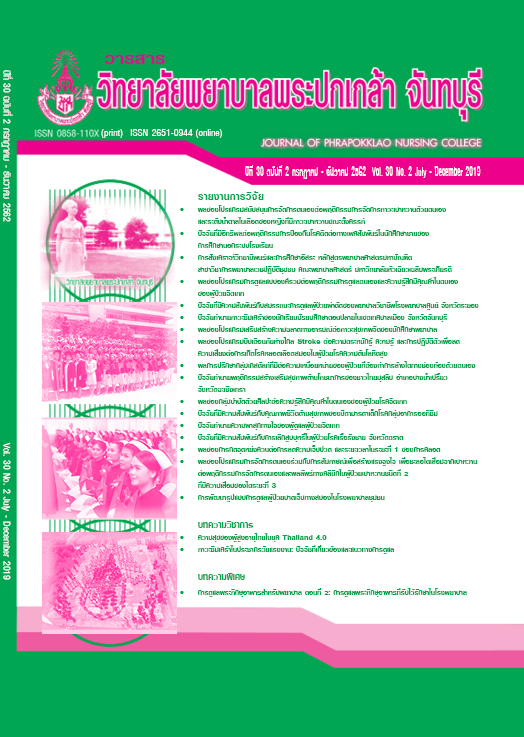Effects of a Combination of Self-management and Motivational Interviewing Program for Delayed Progression of Diabetic Nephropathy on Self-management Behaviors and Clinical Outcomes among Type 2 Diabetic Patients with the Third-stage Diabetic Nephropathy
Keywords:
Self-management, Motivational interviewing, Diabetic nepropathy, Self-management behaviors, Clinical outcomesAbstract
This experimental research aimed to determine the effects of a combination of self-management and motivational interviewing program for delayed progression of diabetic nephropathy on self-management behaviors and clinical outcomes among type 2 diabetic patients. The samples consisted of 60 type 2 diabetic patients with the third-stage diabetic nephropathy who came for follow up visit at a community hospital and were equally divided into an experimental group (n = 30) and a control group (n = 30). The research instruments comprised a combination of self-management and motivational interviewing program for delayed progression of diabetic nephropathy, a video, a manual for self-management, a practice guideline for self-management, a recording form for telephone monitoring, the Six Item Cognitive Impairment Test, a demographic questionnaire, a self-management behaviors questionnaire with the reliability of .88, and the medical devices for clinical outcomes measurement. The implementation and data collection were conducted from November, 2018 to March, 2019. Statistics used for data analysis included frequency, percentage, mean, standard deviation, Chi-square test, Fisher’s exact test, independent t-test, paired t-test, Wilcoxon matched pairs signed-rank test, and Mann-Whitney U test.
The research results revealed that 1) after the experiment, the experimental group had statistically significant higher mean scores of self-management behaviors than before the experiment and those in the control group (p < .001); 2) after the experiment, the experimental group had statistically significant lower fasting blood sugar, HbA1C, systolic and diastolic blood pressure, serum creatinine, and urine microalbumin than before the experiment, and had statistically significant higher eGFR than before the experiment; and 3) after the experiment, the experimental group had statistically significant greater decreased HbA1C, systolic blood pressure, serum creatinine, and urine microalbumin than those in the control group, and had statistically significant greater increased eGFR than those in the control group.
This research suggests that nurses at the diabetic clinic should apply this combination of self-management and motivational interviewing program for type 2 diabetic patients with the third-stage diabetic nephropathy in order to delay the progression of diabetic nephropathy.
References
จันทร์เพ็ญ หวานคำ. (2555). ผลของโปรแกรมการจัดการตนเองต่อพฤติกรรมการควบคุมโรคความดันโลหิตสูงและค่าเฉลี่ยความดันหลอดเลือดแดงของผู้ที่เป็นโรคความดันโลหิตสูง (วิทยานิพนธ์ปริญญามหาบัณฑิต). ปทุมธานี: มหาวิทยาลัยธรรมศาสตร์.
จินตนา หามาลี, นัยนา พิพัฒน์วณิชชา, และรวีวรรณ เผ่ากัณหา. (2557). ผลของโปรแกรมการส่งเสริมการรับรู้ตามแบบแผนความเชื่อด้านสุขภาพต่อพฤติกรรมการชะลอความก้าวหน้าของโรคไตเรื้อรังในผู้สูงอายุโรคเบาหวานชนิดที่ 2 ที่มีภาวะเสี่ยงต่อการเกิดโรคไตเรื้อรัง. วารสารพยาบาลสงขลานครินทร์, 34(2), 67-85.
จุฑามาศ เทียนสอาด, และนิโรบล กนกสุนทรรัตน์. (2559). การสัมภาษณ์เพื่อสร้างแรงจูงใจ แนวคิด และการประยุกต์ใช้ในผู้ป่วยโรคเรื้อรัง. รามาธิบดีพยาบาลสาร, 22(3), 223-232.
ชิณกรณ์ แดนกาไสย, และเพชรไสว ลิ้มตระกูล. (2559). การชะลอการเสื่อมของไตในผู้ป่วยโรคเบาหวานที่มีภาวะแทรกซ้อนทางไตในชุมชน ตำบลพระกลางทุ่ง อำเภอธาตุพนม จังหวัดนครพนม. วารสารการพยาบาลและการดูแลสุขภาพ, 34(2), 6-13.
เบญจมาส เรืองดิษฐ์, เสาวลักษณ์ อุไรรัตน์, และชูลินดา สะมะแอ. (2559). การพัฒนาพฤติกรรมการดูแลตนเองสำหรับผู้ป่วยโรคไตเรื้อรังในเครือข่ายบริการสุขภาพระดับปฐมภูมิ โรงพยาบาลสงขลา. วารสารเครือข่ายวิทยาลัยพยาบาลและการสาธารณสุขภาคใต้, 3(3), 194-207.
รัตนาภรณ์ จีระวัฒนะ, และอภิญญา ศิริพิทยาคุณกิจ. (2559). การพัฒนาความสามารถในการดูแลตนเองของผู้ป่วยเบาหวานที่กลัวภาวะน้ำตาลต่ำในเลือดจากการฉีดอินซูลิน: กรณีศึกษา. รามาธิบดีพยาบาลสาร, 22(3), 233-246.
ลดาวัลย์ ฤทธิ์กล้า, ชดช้อย วัฒนะ, และพีระพงค์ กิติภาวงค์. (2555). ผลของโปรแกรมการส่งเสริมการจัดการตนเองต่อพฤติกรรมการจัดการตนเอง ภาวะหายใจลำบาก ความสามารถในการทำกิจวัตรประจำวัน และคุณภาพชีวิตของผู้ป่วยภาวะหัวใจล้มเหลว. พยาบาลสาร, 39(1) 64-76.
วรวรรณ ชัยลิมปมนตรี, และสุรศักดิ์ กันตชูเวสศิริ. (2559). ตำราโรคไตเรื้อรัง. กรุงเทพฯ: เท็กซ์แอนด์เจอร์นัลพับลิเคชั่น.
วรางคณา พิชัยวงศ์. (2558). โรคไตจากเบาหวาน. วารสารกรมการแพทย์, 40(5), 19-24.
ศรีเพ็ญ สวัสดิมงคล. (2559). รายงานประจำปี 2558 ของสำนักโรคไม่ติดต่อ. กรุงเทพฯ: สำนักงานกิจการโรงพิมพ์ องค์การสงเคราะห์ทหารผ่านศึกในพระบรมราชูปถัมภ์.
ศิริลักษณ์ ถุงทอง. (2557). ผลของโปรแกรมสนับสนุนการจัดการตนเองเพื่อชะลอไตเสื่อมจากเบาหวานต่อพฤติกรรมการจัดการตนเองและผลลัพธ์ทางคลินิกในผู้ป่วยเบาหวานชนิดที่ 2 ที่ไม่สามารถควบคุมระดับน้ำตาลในเลือดได้ (วิทยานิพนธ์ปริญญามหาบัณฑิต). มหาวิทยาลัยสงขลานครินทร์.
สมาคมความดันโลหิตสูงแห่งประเทศไทย. (2558). แนวทางการรักษาโรคความดันโลหิตสูงในเวชปฏิบัติทั่วไป พ.ศ. 2555 ปรับปรุง พ.ศ. 2558. สืบค้นจาก https://www.thaihypertension.org/files/GL%20HT%202015.pdf
สมาคมโรคไตแห่งประเทศไทย. (2558). คําแนะนําสําหรับการดูแลผู้ป่วยโรคไตเรื้อรังก่อนการบําบัดทดแทนไต พ.ศ. 2558. สืบค้นจาก https://www.nephrothai.org/images/10-11-2016/Final_%E0%B8%84%E0%B8%A1%E0%B8%AD_CKD_2015.pdf
สมาคมโรคเบาหวานแห่งประเทศไทย ในพระราชูปถัมภ์ สมเด็จพระเทพรัตนราชสุดาฯ สยามบรมราชกุมารี. (2560). แนวเวชปฏิบัติสำหรับโรคเบาหวาน. กรุงเทพฯ: ร่มเย็น มีเดีย.
สุภาพ อารีเอื้อ, และพิชญ์ประอร ยังเจริญ. (กำลังจัดพิมพ์). แบบประเมินสมรรถนะการรู้คิด 6 ข้อ ฉบับภาษาไทย: การทดสอบคุณสมบัติทางจิตวิทยา.
อภิรดี เจริญนุกูล, ยุพารัตน์ สุริโย, และปาจรีย์ ตรีนนท์. (2555). ความสัมพันธ์ระหว่างระดับการพัฒนาความสามารถในการดูแลตนเองกับระดับฮีโมโกลบินเอวันซีของผู้ป่วยเบาหวานประเภทที่ 2 ที่ควบคุมโรคไม่ได้. วารสารพยาบาลกระทรวงสาธารณสุข, 22(2), 37-48.
อรวรรณ ประภาศิลป์, ชดช้อย วัฒนะ, และทิพาพร ธาระวานิช. (2556). ผลของโปรแกรมการส่งเสริมสมรรถนะในการจัดการตนเองต่อพฤติกรรมการจัดการตนเอง ภาวะอ้วน ความเสี่ยงต่อการเกิดโรคหัวใจและหลอดเลือด และการหายจากภาวะเมตาบอลิกซินโดรมในผู้ที่มีภาวะเมตาบอลิกซินโดรม. พยาบาลสาร, 40(1), 34-48.
Barrera, M., Toobert, D. J., Strycker, L. A., Osuna, D., King, D. K., & Glasgow, R. E. (2011). Multiple-behavior–change interventions for women with type 2 diabetes. Diabetes Spectrum, 24(2), 75-80.
Cohen, J. (1988). Statistical power analysis for the behavioral sciences (2nd ed.). Hillsdale, NJ: Lawrence Erlbaum Associates.
Creer, L. T. (2000). Self-management of chronic illness. In M. Boekaerts, P. R. Pintrich, & M. Zeidner (Eds.). Handbook of self-regulation (pp. 601-629). San Diego, CA: Academic Press.
Miller, W. R., & Rollnick, S. (1991). Motivational interviewing: Preparing people to change addictive behavior. New York: Guilford Press.
Song, D., Xu, T. Z., & Sun, Q. H. (2014). Effect of motivational interviewing on self-management in patients with type 2 diabetes mellitus: A meta-analysis. International Journal of Nursing Sciences, 1(3), 291-297.
Zoppini, G., Targher, G., Chonchol, M., Ortalda, V., Negri, C., Stoico, V., & Bonora, E. (2012). Predictors of estimated GFR decline in patients with type 2 diabetes and preserved kidney function. Clinical Journal of the American Society of Nephrology, 7(3), 401-408.
Downloads
Published
How to Cite
Issue
Section
License
Copyright (c) 2019 JOURNAL OF PHRAPOKKLAO NURSING COLLEGE

This work is licensed under a Creative Commons Attribution-NonCommercial-NoDerivatives 4.0 International License.
เนื้อความ ข้อมูล และรายการอ้างอิงที่ผู้เขียนใช้ในการเขียนบทความเพื่อลงตีพิมพ์ในวารสารวิทยาลัยพยาบาลพระปกเกล้า จันทบุรี ถือเป็นความคิดเห็นและความรับผิดชอบของผู้เขียน คณะผู้จัดทำวารสารไม่จำเป็นต้องเห็นพ้องด้วยหรือร่วมรับผิดชอบ
บทความที่ได้รับการลงตีพิมพ์ในวารสารวิทยาลัยพยาบาลพระปกเกล้า จันทบุรี ถือเป็นลิขสิทธิ์ของวารสารวิทยาลัยพยาบาลพระปกเกล้า จันทบุรี หากหน่วยงานหรือบุคคลใดต้องการนำส่วนหนึ่งหรือทั้งหมดของบทความไปเผยแพร่ต่อเพื่อวัตถุประสงค์ใด ๆ จะต้องได้รับอนุญาตจากบรรณาธิการวารสารก่อน



